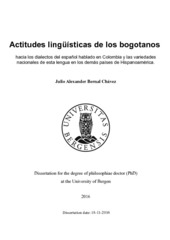| dc.description.abstract | The aim of this study is to describe the linguistic attitudes in people from Bogota towards the dialects of Spanish in Colombia and the national varieties of it in other countries of Latin America. This project follows the research parameters of the project Linguistic identity and Attitudes in Spanish-speaking Latin America (LIAS)—funded by the Research Council of Norway— and applies LIAS methodology in Colombia. 400 Speakers from Bogotá were interviewed using a questionnaire with 41 questions. Informants were selected taking into account variables such as socioeconomic status, age and sex, and in proportion to the demographic composition of Bogotá reported in 2005-2006. The surveys were conducted with direct method, since this inquires directly into the informants’ attitudes and manners. As the survey comprises open and close questions, and there are also questions with an option to explain or justify the answer, quantitative and qualitative analyses were applied. In the case of the questions about Colombian national varieties, it was necessary to organize the regions according to the geographic distribution of dialects and superdialects posited in the Atlas Lingüístico-Etnográfico de Colombia [Linguistic and Etnographic Atlas of Colombia]. The descriptions about Spanish national varieties belong to the countries: Argentina, Bolivia, Chile, Colombia, Costa Rica, Cuba, Ecuador, El Salvador, Spain, Guatemala, Honduras, Mexico, Nicaragua, Panama, Paraguay, Peru, Puerto Rico, Dominican republic, Uruguay and Venezuela and Belize. In some questions, there were emerging categories of description and analysis such as: phonetics, lexical-semantics, morphosyntactics, spelling, comprehension, communication, standard language, contextualization, politeness, media, truth, affection, reasoning, ethics, identity, linguistic identity, culture. The chapter of conceptual framework has five subjects: (1) Linguistic attitudes, (2) linguistic identity, (3) standard variety, (4) language policy and planning, and (5) Characterization of Colombian Spanish. The interest of exposing these issues is related to language attitudes in the way that speakers focus their use or interact with others and with their linguistic varieties; this supports the descriptions and analyses of the linguistic attitudes found in the answers given by the respondents. The chapter of analysis has seven subjects: (1) The positive and negative attitudes towards Spanish dialects in Colombia; (2) the names given by the respondents to the language they speak; (3) the attitudes about linguistic correctness in the Latin American countries; (4) the perceptions of linguistic similarities and differences in the varieties of Spanish spoken in Latin American countries; (5) the dialectal preferences of the media in Latin American countries; (6) the forms of address and the degrees of liking, disliking, ignorance levels and indifference that respondents display towards national varieties of Spanish in Latin American countries; and (7) the associations that informants make between Latin American countries and features like anger, technology, elegance, high economic resources, respect, affection, authority, vulgarity and sense of humor. | en_US |
